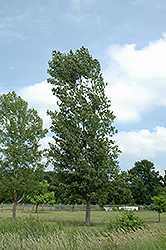Fri & Sat 8am - 8pm
Sun 8am - 7pm
Anytown, USA 12345
fax: 261.787.0463
e-mail: info@successgc.com


Plant Finder

Height: 50 feet
Spread: 30 feet
Sunlight:
![]()
Hardiness Zone: 2a
Other Names: Hybrid Poplar, Seedless Cottonwood
Description:
A tall rounded shade tree that's fast growing and tolerant of the worst growing conditions; a seedless hybrid that produces no messy cotton; has an aggressive root system, so don't plant near houses; makes a great windbreak or quick shade tree
Ornamental Features
Highland Poplar has rich green deciduous foliage on a tree with an oval habit of growth. The large serrated heart-shaped leaves turn yellow in fall.
Landscape Attributes
Highland Poplar is a deciduous tree with a shapely oval form. Its relatively coarse texture can be used to stand it apart from other landscape plants with finer foliage.
This tree will require occasional maintenance and upkeep, and is best pruned in late winter once the threat of extreme cold has passed. It has no significant negative characteristics.
Highland Poplar is recommended for the following landscape applications;
- Shade
- Windbreaks and Shelterbelts
Planting & Growing
Highland Poplar will grow to be about 50 feet tall at maturity, with a spread of 30 feet. It has a high canopy with a typical clearance of 5 feet from the ground, and should not be planted underneath power lines. It grows at a fast rate, and under ideal conditions can be expected to live for 60 years or more.
This tree should only be grown in full sunlight. It is an amazingly adaptable plant, tolerating both dry conditions and even some standing water. It is considered to be drought-tolerant, and thus makes an ideal choice for xeriscaping or the moisture-conserving landscape. It is not particular as to soil type or pH, and is able to handle environmental salt. It is highly tolerant of urban pollution and will even thrive in inner city environments. This particular variety is an interspecific hybrid.
